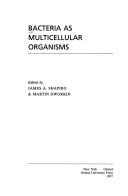| Listing 1 - 3 of 3 |
Sort by
|

ISBN: 9780195091595 0195091590 Year: 1997 Publisher: New York (N.Y.) : Oxford university press,
Abstract | Keywords | Export | Availability | Bookmark
 Loading...
Loading...Choose an application
- Reference Manager
- EndNote
- RefWorks (Direct export to RefWorks)
Bacteria as Multicellular Organisms is the first book devoted specifically to multicellular aspects of bacterial life. Contrary to conventional wisdom, which treats bacteria as autonomous single cells, this book shows how bacteria are sentient, interactive organisms with an unexpectedly broad repertoire of chemical and physical mechanisms for signaling each other and organizing themselves into multicellular aggregates with novel properties. The book has been compiled from reports by specialists in a variety of disciplines from genetics and microbiology to environmental engineering and biotechnology. This interdisciplinary approach reflects the growing importance of bacteria as key experimental material for investigating phenomena common to many fields in contemporary science: communication, complexity, self-organization, and pattern formation. The impact of bacterial multicellularity will affect such diverse areas as evolutionary population biology, non-linear dynamics, and information science.
Bacteria --- Microbial aggregation. --- Ecology.

ISBN: 0444827986 9786611795863 1281795860 008054388X 9780444827982 9780080543888 Year: 1997 Publisher: Amsterdam New York Elsevier
Abstract | Keywords | Export | Availability | Bookmark
 Loading...
Loading...Choose an application
- Reference Manager
- EndNote
- RefWorks (Direct export to RefWorks)
Vaso-occlusive disorders including unstable angina, myocardial infarction, transient ischemic attacks, stroke and peripheral artery disease remain the major sources of morbidity and mortality in western civilization. Platelet activation and resulting platelet aggregation play a major role in the pathogenesis of these thromboembolic diseases. Recognition of the contribution of platelets to the pathophysiology of cardiovascular disease has provided impetus for the continued search for new antiplatelet agents.
Pharmaceutical chemistry --- Congresses --- Chemistry --- Physical sciences --- Chimie pharmaceutique --- Platelet Aggregation Inhibitors
Book
Year: 1997 Publisher: Portland, Or. : Northwest Power Planning Council,
Abstract | Keywords | Export | Availability | Bookmark
 Loading...
Loading...Choose an application
- Reference Manager
- EndNote
- RefWorks (Direct export to RefWorks)
Fishways --- Fish aggregation devices --- Diversion structures (Hydraulic engineering) --- Pacific salmon --- Effect of dams on
| Listing 1 - 3 of 3 |
Sort by
|

 Search
Search Feedback
Feedback About UniCat
About UniCat  Help
Help News
News